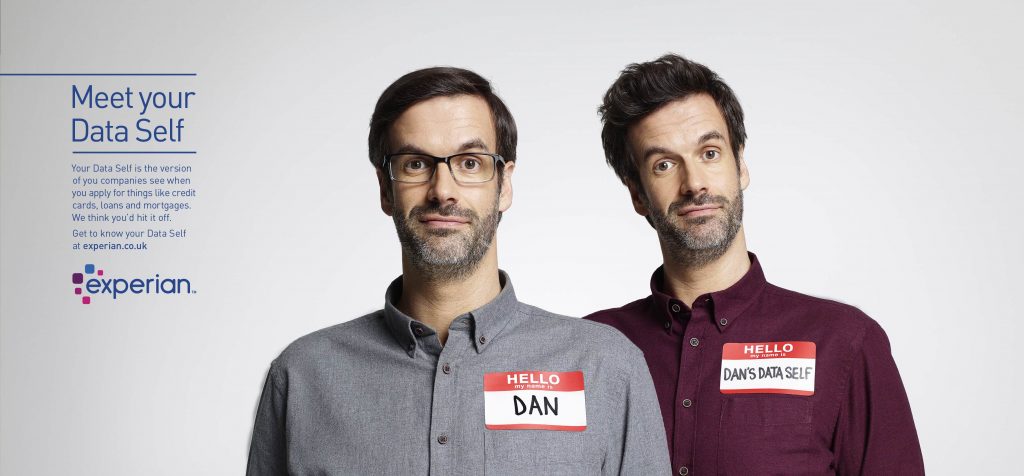You might have seen these adverts on the TV or on a billboard: a man and his doppelgänger, one looking buttoned up and neat and the other, somehow cooler. “Meet your Data Self”, says the poster advert on the tube station wall I often stare at when I’m waiting for the next train. In smaller type, it explains: “Your Data Self is the version of you that companies see when you apply for things like credit cards, loans and mortgages”. And then: “You two should get acquainted”.
This advert has bothered me for quite a while. I’m sure that’s partially intentional—whether I find it funny or whether I find it irritating, its goal is to make the brand it’s advertising, Experian PLC, stick in my mind. I find the actor who plays this everyman and his double, Marcus Brigstocke, annoying—score one to the advert. Beyond Brigstocke’s cocked brow, what bothers me is that this advert raises far more questions than it answers.
Who is this “Data Self” it’s telling me to get acquainted with? Is this person really like me, only less presentable? What impact does this other me have on what the actual me can do? And—this question might come across as a little odd—who does this other me belong to?
Experian is a Credit Reference Agency, so presumably the other ‘me’ is a representation of my financial history: how good I am at paying my bills on time; whether I’ve been knocked back for a credit card or overdraft; even if I’ve been checking my credit history a lot lately, which might come across as suspicious. Banks, credit card companies, phone companies, car dealers—anyone who might extend you credit so you can get a loan or pay something off over time will check in with agencies like Experian to see if you’re a responsible person to lend to.
As a recently-finished PhD student, I’ve no doubt that my other me is not so presentable, to use the visual metaphor presented by this advert’s actor/doppelgänger. A company like Experian might advise another company, like a bank, to not front me money for the long summer holiday I’m dreaming of taking to Northern Italy as I wait for the next packed tube. This “me” might not be trustworthy. Or, to put it another way, this “me” might not indicate trustworthiness.
The point of this advert is to get me to order a credit report from Experian so that I can understand my credit history and so that I can build it up or make it better. This service is central to the contemporary finance industry, which has to weigh the risk of lending money or extending credit to someone like me against the reward they get when I pay it back. If I want to be a better me, it suggests, I ought to get better acquainted with myself—or rather, my data self. If I want that holiday, its visual metaphor suggests, I’d better straighten my data self’s tie.
There’s lots more that might be said about how credit agencies inform the choices we can make and handle our data. One of the more straightforward comments we might make about them is also one that interests us most: This other, data “me” isn’t me. This is perhaps obvious—the advert’s doppelgänger is a metaphor, after all. It’s a person like me, it’s constructed from data about me, and it influences my life, but it’s not me. But this also means that This other, data “me” isn’t mine.
This advert presents just one example of the many data selves produced when we consciously or inadvertently give up our data to other companies. In this case, we agree to our data being passed on to credit rating agencies like Experian every time we get given credit. What’s interesting about this data self is that whilst it isn’t you, it has an effect on a future version of you—in my offhand example, a you who might be holidaying in Italy; or, more problematically, a you who might need an overdraft to make ends meet month-to-month. To riff on our project’s title, these data selves are, quite literally, people like you. They might not be you, but they have a real effect on your life.
We need todo a lot more work researching who these datafied versions of ourselves actually are and what effect they have on being a person in our big data present. As Experian point out in another campaign fronted by food writer and austerity campaigner Jack Monroe, several million U.K. residents are “invisible” to the country’s financial services because they don’t have a credit profile. Conversely, we might ask, what does it mean to be a person in our big data present if who we are is judged on our data doppelgängers? What does it mean when my other “me” isn’t mine—when it’s opaque, confusing, and sold to me as a service?
Countless other digital platforms and services create both fleeting and lasting “data selves” that are used to try to sell us products, for instance, or to better tailor services to our needs. This process is called “personalisation”. One of the things we want to ask as part of our research project is this: who are we when who we are is determined by who we are like? Credit Reference Agencies and the “data selves” they produce make this tangled question tangible, but it applies to many other areas of contemporary life—from finance to medicine, from our participation in digital culture to our status as individuals, actors, citizens, and members of populations. This question raises others about what it means to be a “me” in the present. These are the questions, I think, that bind this project together.
For more information about Credit Reference Agencies, see the Information Commissioner’s Office information page.
